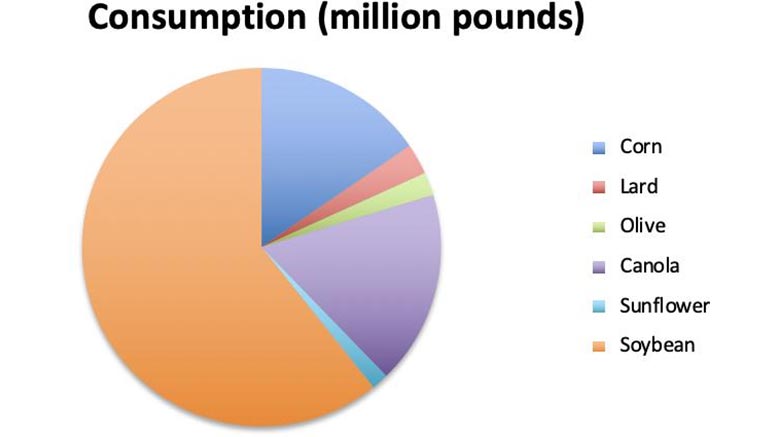
Used for fast food frying, added to packaged foods, and fed to livestock, soybean oil is by far the most widely produced and consumed edible oil in the U.S., according to the U.S. Department of Agriculture. In all likelihood, it is not healthy for humans.
America’s most widely consumed oil, soybean oil, linked to metabolic and neurological changes in mice.
New University of California Riverside research shows soybean oil not only leads to obesity and diabetes, but could also affect neurological conditions like autism, Alzheimer’s disease, anxiety, and depression.
Used for fast food frying, added to packaged foods, and fed to livestock, soybean oil is by far the most widely produced and consumed edible oil in the U.S., according to the U.S. Department of Agriculture. In all likelihood, it is not healthy for humans.
It certainly is not good for mice. The new study, published on January 8, 2020, in the journal Endocrinology, compared mice fed three different diets high in fat: soybean oil, soybean oil modified to be low in linoleic acid, and coconut oil.
“If there’s one message I want people to take away, it’s this: reduce consumption of soybean oil.” — Poonamjot Deol
The same UCR research team found in 2015 that soybean oil induces obesity, diabetes, insulin resistance, and fatty liver in mice. Then in a 2017 study, the same group learned that if soybean oil is engineered to be low in linoleic acid, it induces less obesity and insulin resistance.
However, in the study released this month, researchers did not find any difference between the modified and unmodified soybean oil’s effects on the brain. Specifically, the scientists found pronounced effects of the oil on the hypothalamus, where a number of critical processes take place.
“The hypothalamus regulates body weight via your metabolism, maintains body temperature, is critical for reproduction and physical growth as well as your response to stress,” said Margarita Curras-Collazo, a UCR associate professor of neuroscience and lead author on the study.
The team determined a number of genes in mice fed soybean oil were not functioning correctly. One such gene produces the “love” hormone, oxytocin. In soybean oil-fed mice, levels of oxytocin in the hypothalamus went down.
The research team discovered roughly 100 other genes also affected by the soybean oil diet. They believe this discovery could have ramifications not just for energy metabolism, but also for proper brain function and diseases such as autism or Parkinson’s disease. However, it is important to note there is no proof the oil causes these diseases.
Additionally, the team notes the findings only apply to soybean oil — not to other soy products or to other vegetable oils.
“Do not throw out your tofu, soymilk, edamame, or soy sauce,” said Frances Sladek, a UCR toxicologist and professor of cell biology. “Many soy products only contain small amounts of the oil, and large amounts of healthful compounds such as essential fatty acids and proteins.”
A caveat for readers concerned about their most recent meal is that this study was conducted on mice, and mouse studies do not always translate to the same results in humans.
Also, this study utilized male mice. Because oxytocin is so important for maternal health and promotes mother-child bonding, similar studies need to be performed using female mice.
One additional note on this study — the research team has not yet isolated which chemicals in the oil are responsible for the changes they found in the hypothalamus. But they have ruled out two candidates. It is not linoleic acid, since the modified oil also produced genetic disruptions; nor is it stigmasterol, a cholesterol-like chemical found naturally in soybean oil.
Identifying the compounds responsible for the negative effects is an important area for the team’s future research.
“This could help design healthier dietary oils in the future,” said Poonamjot Deol, an assistant project scientist in Sladek’s laboratory and first author on the study.
“The dogma is that saturated fat is bad and unsaturated fat is good. Soybean oil is a polyunsaturated fat, but the idea that it’s good for you is just not proven,” Sladek said.
Indeed, coconut oil, which contains saturated fats, produced very few changes in the hypothalamic genes.
“If there’s one message I want people to take away, it’s this: reduce consumption of soybean oil,” Deol said about the most recent study.
Reference: “Dysregulation of Hypothalamic Gene Expression and the Oxytocinergic System by Soybean Oil Diets in Male Mice” by Poonamjot Deol, Elena Kozlova, Matthew Valdez, Catherine Ho, Ei-Wen Yang, Holly Richardson, Gwendolyn Gonzalez, Edward Truong, Jack Reid, Joseph Valdez, Jonathan R Deans, Jose Martinez-Lomeli, Jane R Evans, Tao Jiang, Frances M Sladek and Margarita C Curras-Collazo, 8 January 2020, Endocrinology.
DOI: 10.1210/endocr/bqz044










It’s not enough to bury the caveat ‘in mice’ in the text somewhere. Your headline is misleading everyone that scans past it on to other things into believing, on some level, there might be a danger that may be non-existent in humans. Put it there instead. Drop the ‘warning’. Stop screwing up our national health for your clickthrough.
“Buried in the text somewhere”??? It is in the subtitle you ignoramus. Please don’t dumb down science articles for some potential idiots that don’t even read the first line of an article.
Pretty much explains Trumpism and why modern world is doomed.
TDS is obvious in your case.
While the study did indicate a correlation between soybean oil and genetic changes in the hypothalamus, the reported results indicate that further research into the effects of soybean oil on genetic changes in the brain is needed. Moreover, the wording of the headline is grossly misleading. The vast majority of people read headlines without reading the article behind the headline. Even less read the actual study itself. Regardless of the article’s intention to inform the public about possible health risks, the headline does nothing more than put fear into people’s minds. A correlation, even a strong correlation, does not equal causation. This is cliche at this point and a website devoted to science should know better.
Except you are clearly wrong in this case. The headline is correct, as the study indeed shows ‘causation’ not just ‘correlation’.
It is an experimental study designed to show cause. You may be confused with observational studies, where it is indeed hard to show causation.
I agree that title is misleading it should add studies in mice show….. moreover in such studies mice are often fed a very high diet or amount of oil which is not case with humans so may not fit. Anyway excess of even good things is always dangerous. Take a example of paracetamol drug
These are basic things that should have been looked at decades ago. We have the NIH spending billion and billions. Why the heck can we get a study done using a couple dozen oils and macaques or pygmy marmosets? Conceivably we could make a huge impact on public health.
Grape seed oil has been widely available for decades, yet I find almost nothing on it. Rice bran oil I think is pretty good stuff, but again almost nothing. I have been using some pistachio oil lately because it likely has low AGEs but I can’t verify that. I use mostly avocado oil, but not much on that either. I use some flax seed oil in my scrambled eggs, a little more info on that but still lacking. Olive and canola have high AGEs. Corn is very low. What about wheatgerm oil? Analysis would be very nice, but what we really need are studies where animals and ultimately humans eat the oils. Maybe macaques and marmosets are not ideal, I don’t know. I just don’t trust rat and mouse studies on nutrition. We probably need to test some omnivores as well as the primates. Perhaps raccoons?
well if you’re so ignorant you only read the headlines you deserve to be afraid from time immemorial headlines have been used to get ones attention to then read the article
We will continue to eat soy oil. You just wants to discredit soy oil. You export oil branded vegetable oil with telling us what the vegetable is.
You did that to palm oil, coconut oil because such fruits do not grow on your soil. When created everything HE said it was good. Stupid research
This might relate in some way, but recently I’ve been reading about this.
Have you ever heard of gut health? Certain foods have bad proteins in them that tear your gut lining and can cause “leaky gut” and countless of other problems, even relating to the brain.
The title is scientifically wrong.
The study report gene expression changes, which means that the relative levels of RNA transcript (produced from the genes) are changed in the tissues that the experimenters studied in mouse models.
This is an egregious error in understanding because the study does not claim that the DNA sequence changed. They studies the RNA transcript levels by RNA-seq and showed that the RNA levels have changed, which is reflective of *epigenetic* changes (i.e. non-genetic changes). Genetic changes mean that the DNA sequence have changed.
(It is true that the experimenters sequenced the RNA transcripts, but they only used information from the relative counts of the transcripts, which is reflective of the relative transcript levels. They could have looked at how the RNA sequences changed, which may reflect how the source DNA sequence changed, but this analysis is fraught with technical artifacts. The scientists knew the limitations of their study, and they did not try to report incorrect results.)
As for the correlation vs. causation argument, this study is an experimental study, so it looked at causation directly. They gave 4 groups of mice different diet (soybean oil, low-LA soybean oil, coconut oil, and low-fat), and they measured the RNA expression levels in selected tissues. In other words, they performed an experimental intervention under controlled settings, and they studied how the intervention caused changes in in measurable outcomes. Hence, they studied the causal effects of these interventions.
As for the human vs. mouse argument, it is important to recognize that human and different from mice. If you read and understand the study, you’ll realize that this study could not have been possible to do in humans. The study cut out the hypothalamuses of the mice. You can’t do that to a living human. You could collect the hypothalamus after death, but there would be many confounding factors that influence the outcome being measured; additionally, you would have to sustain the diet for a very very long time (likely against their wishes) — which is either feasible nor ethical. Therefore, scientists make do with what they can be feasibly and ethically, and they interpret their findings in light of the limitations of their experiments.
As for why the NIH is not funding more of these studies. It’s because the scientific impact is low. The science is clear: high fat diet is bad; low fat diet is better. More science can tell you how a high fat diet is bad and perhaps which fats are less bad than others, but does it really matter? Will it really change people’s eating habits?